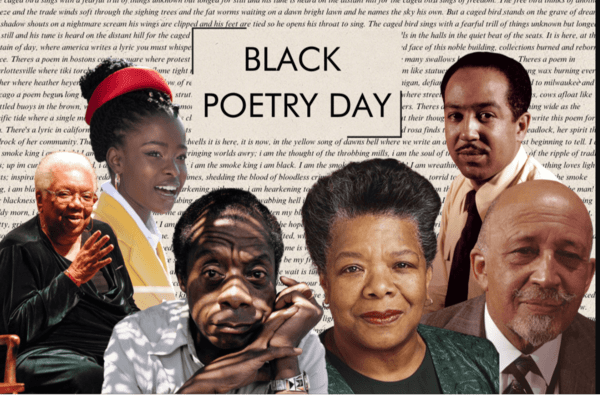(ThyBlackMan.com) Black poetry is an expansive and dynamic form of expression that has played a crucial role in articulating the experiences, struggles, and triumphs of Black people, primarily those of African descent. It transcends mere words on a page; it is a powerful medium through which Black poets have historically engaged with themes of identity, resistance, love, sorrow, and hope. This article delves into the essence of Black poetry, tracing its origins, examining its evolution over time, and highlighting its profound impact on both literature and the broader socio-cultural landscape.

Historical Roots and Evolution
Early Beginnings
The roots of Black poetry can be traced back to Africa, where oral traditions and storytelling were integral to communal life. These early forms of poetic expression were rich in proverbs, myths, and folk tales, often performed with music and dance. The transatlantic slave trade violently uprooted millions of Africans, dispersing them across the Americas and the Caribbean. Yet, even in the face of brutal enslavement, Africans and their descendants preserved and adapted their oral traditions, weaving them into the fabric of their new, forcibly adopted cultures.
The Harlem Renaissance and Beyond
The Harlem Renaissance of the 1920s marked a significant turning point for Black poetry in the United States. This cultural movement, centered in Harlem, New York, saw a flourishing of arts and literature, with Black poets like Langston Hughes, Claude McKay, and Countee Cullen coming to the fore. Their works not only celebrated African American culture but also confronted the harsh realities of racism, inequality, and identity.
In the decades that followed, Black poetry continued to evolve, reflecting the changing times. The Civil Rights Movement and the Black Arts Movement of the 1960s and 1970s, for instance, sparked a new wave of politically charged and socially conscious poetry. Poets such as Maya Angelou, Amiri Baraka, and Nikki Giovanni used their craft to challenge systemic racism, advocate for civil rights, and affirm Black identity and pride.
Themes and Styles
Black poetry encompasses a wide range of themes and styles, reflecting the diversity of the Black experience. Some of the recurring themes include:
- Identity and Self-Discovery: Many Black poets explore questions of identity, delving into the complexities of race, heritage, and the search for self in a world that often seeks to marginalize or erase Black identities.
- Resistance and Liberation: From the earliest slave songs to contemporary spoken word, Black poetry has served as a vehicle for resistance against oppression and a call for freedom and justice.
- Community and Belonging: The sense of community, whether found or forged, is a powerful theme, highlighting the importance of connection, support, and collective memory among Black people.
- Love and Loss: Black poetry also captures the universal human experiences of love and loss, joy and sorrow, imparting emotional depth and universality to its narratives.
- Nature and Spirituality: Some poets draw on themes of nature and spirituality, linking the physical and metaphysical in their exploration of life’s mysteries.
The styles of Black poetry are equally varied, ranging from traditional forms such as sonnets and ballads to free verse, experimental structures, and the dynamic rhythms of spoken word and rap.
Prominent Figures
Over the years, Black poetry has been shaped by numerous influential poets, each bringing their unique voice and perspective to the genre. A few notable figures include:
- Langston Hughes: A leading voice of the Harlem Renaissance, Hughes’s poetry celebrated the lives of ordinary African Americans, blending lyricism with social commentary.
- Maya Angelou: Renowned for her autobiographical poetry and prose, Angelou’s works, such as “Still I Rise,” resonate with themes of resilience and dignity.
- Audre Lorde: Lorde’s poetry is known for its lyrical beauty and powerful exploration of issues related to race, gender, and sexuality.
- Derek Walcott: A Nobel Laureate from Saint Lucia, Walcott’s poetry is infused with the beauty of the Caribbean landscape and the complex legacies of colonialism.
- Rita Dove: The first African American Poet Laureate of the United States, Dove’s poetry is characterized by its wide-ranging exploration of history, politics, and personal life.
Impact on Culture and Society
Black poetry has had a profound impact on both culture and society, serving as a mirror to the times and a catalyst for change. It has been instrumental in shaping the cultural identity of Black communities, preserving their histories and traditions while also pushing boundaries and challenging societal norms. Moreover, Black poetry has played a key role in the civil rights movement and other social justice movements, using the power of words to inspire action and advocate for equality.
Conclusion
Black poetry is not just a genre; it is a vibrant and vital form of cultural expression that has enriched the literary world and beyond. It is a testament to the resilience, creativity, and spirit of Black people, offering insights into their lives and experiences while universalizing the quest for justice, love, and belonging. As it continues to evolve, Black poetry remains a profound force for reflection, connection, and liberation.
This brother has a passion for poetry and music. One may contact him at; JJackson@ThyBlackMan.com.

















Black Poetry is a form of writing unique to America consisting of the detailing, in English language, using English grammar, of African, and African descendant’s adjustments to western world colonization ranging from the days of chattel slavery to contemporary American citizenship that here-to-fore selectively proves a meeting of the black and white minds of some experts through the usage of the English language. Black poetry provides subjective feedback to the majority race and also helps to convince this majority that some degree of humanity still exists in the oppressed black race in America despite centuries of being treated sub-human. Ironically, black poetry isn’t entertaining but is a cry for help.